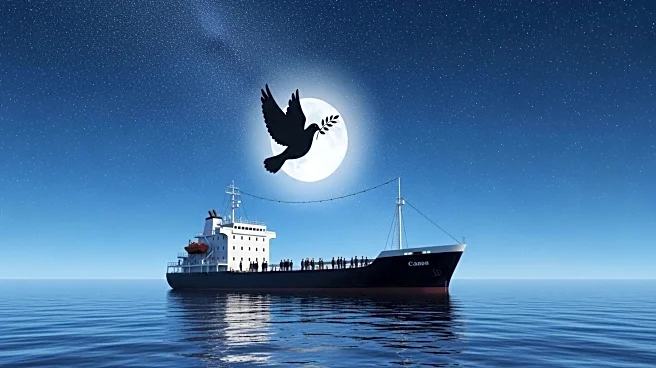What's Happening?
Israel's navy has intercepted a flotilla bound for the Gaza Strip, detaining activists including Swedish climate activist Greta Thunberg. The flotilla, known as the Global Sumud Flotilla, aimed to deliver humanitarian aid to Gaza and challenge Israel's blockade of the Palestinian enclave. The convoy, at its peak, consisted of over 40 civilian boats carrying lawmakers, lawyers, and human rights advocates. According to the Israeli Foreign Ministry, all passengers are safe and in good health, and they are being transported to Israel for deportation to Europe. The flotilla organizers reported that 440 participants were forcibly removed from their vessels in international waters. Despite the interception, one boat remains at a distance from the coast, and organizers are still in communication with it. The Israeli Foreign Ministry offered the flotilla a way to deliver aid through 'safe channels' and warned them of approaching an active combat zone.
Why It's Important?
The interception of the flotilla highlights ongoing tensions surrounding the Israeli blockade of Gaza, which has been a point of international contention. The blockade is part of Israel's broader security measures against Hamas, but it has also been criticized for exacerbating humanitarian conditions in Gaza. The involvement of high-profile activists like Greta Thunberg brings additional global attention to the issue, potentially influencing public opinion and diplomatic relations. The incident has already sparked international criticism and protests, with leaders from countries like Colombia and Malaysia calling for the release of detained activists. The situation underscores the complex geopolitical dynamics in the region and the challenges of balancing security concerns with humanitarian needs.
What's Next?
The Israeli government plans to deport the detained activists to Europe, but the incident may lead to further diplomatic fallout. Countries with citizens involved in the flotilla may increase pressure on Israel, and international protests could continue. The flotilla organizers have vowed to persist in their mission to break the blockade, suggesting that similar efforts may occur in the future. The situation could also impact ongoing negotiations and peace efforts in the region, particularly as Israel tightens its siege on Gaza City. The international community will likely continue to monitor the situation closely, with potential implications for Israel's diplomatic relations and its policies regarding Gaza.
Beyond the Headlines
The interception of the flotilla raises broader questions about the legality and ethics of blockades in conflict zones. It also highlights the role of international activism in drawing attention to humanitarian crises. The use of non-lethal measures like skunk water by Israel to deter the flotilla reflects the complexities of enforcing blockades while minimizing harm. The incident may influence future humanitarian missions and the strategies employed by activists to challenge blockades and other restrictive measures. Additionally, the involvement of diverse international participants underscores the global nature of the issue and the widespread concern over the humanitarian situation in Gaza.











